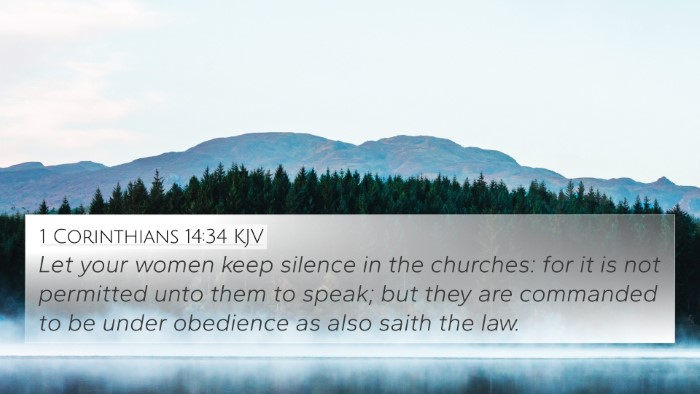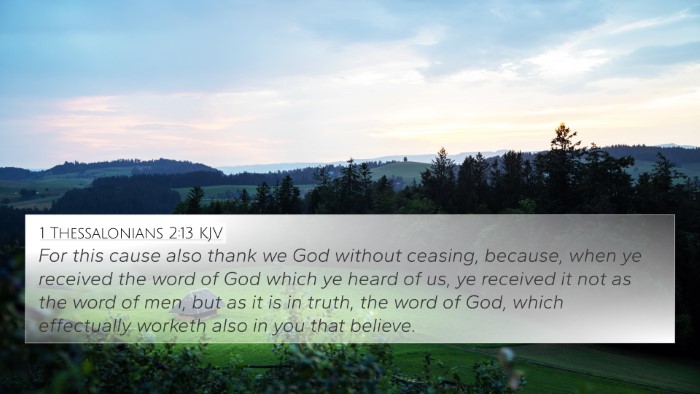Summary and Interpretation of 1 Corinthians 9:8
Verse: 1 Corinthians 9:8 - "Am I saying this merely on human authority? Doesn't the Law say the same thing?"
Meaning and Insights
This verse occurs in the context where the Apostle Paul defends his authority and the validity of receiving support for his ministry. Let's explore its implications through various commentaries.
Matthew Henry's Commentary
Matthew Henry emphasizes that Paul's argument here centers on the legitimacy of a minister's right to material support from the congregation. He highlights that Paul is appealing to both human customs and divine law to reinforce his point. By saying "Doesn't the Law say the same thing?", he connects his argument to scriptural traditions, showing that this is not merely a personal opinion but has a basis in the Scriptures.
Albert Barnes' Notes
Albert Barnes explains that Paul seeks to invalidate opposition to his rights by presenting established norms in both society and the Scriptures. He mentions that Paul is addressing those who challenge his motives and status as an apostle, insisting that his stance aligns with both natural justice and revealed law. Barnes emphasizes that to neglect support for those who preach is contrary to what the Law teaches.
Adam Clarke's Commentary
Adam Clarke provides additional insight into how Paul relates his argument to the Law of Moses and the principles established therein. Clarke notes Paul's strategic use of questions to persuade his audience of the righteousness of his defense. He highlights that invoking the Law serves to strengthen Paul's claim that supporting gospel ministers is ordained by divine precept, indicating that this principle spans both testaments.
Cross-References for Deeper Understanding
To further delve into the context of 1 Corinthians 9:8, consider the following cross-references:
- Galatians 6:6: "Let the one who is taught the word share all good things with the one who teaches." - This reinforces the principle of support for teachers.
- 1 Timothy 5:17-18: "Let the elders who rule well be considered worthy of double honor, especially those who labor in preaching and teaching." - Acknowledges the rightful compensation for spiritual leaders.
- Luke 10:7: "And remain in the same house, eating and drinking what they provide, for the laborer deserves his wages." - Jesus affirms the principle of support for ministers.
- Numbers 18:20-21: "And the Lord said to Aaron, 'You shall have no inheritance in their land, neither shall you have any portion among them. I am your portion and your inheritance among the people of Israel.'" - This demonstrates God’s provision for His servants.
- Deuteronomy 25:4: "You shall not muzzle an ox when it is treading out the grain." - Illustrates the biblical principle of ensuring provisions for those who labor.
- Philippians 4:15-16: "And you Philippians yourselves know that in the beginning of the gospel, when I left Macedonia, no church entered into partnership with me in giving and receiving, except you only." - Affirms the practice of supporting the gospel laborers.
- 2 Corinthians 11:8-9: "I robbed other churches by accepting support from them in order to serve you." - Paul elucidates on the support he receives from other churches while ministering to the Corinthians.
Thematic Connections and Inter-Biblical Dialogue
The themes presented in 1 Corinthians 9:8 resonate through various biblical texts, forming a dialogical structure across both the Old and New Testaments. Here are some thoughts on those connections:
- Support for God’s Messengers: The Old Testament lays groundwork for the respect and provision due to God’s chosen servants, echoed in New Testament teachings.
- Justice and Fairness: Both Testaments emphasize principles of fairness and justice, urging communities to sustain their ministers.
Reflections on Practical Application
Understanding 1 Corinthians 9:8 calls for both theological and practical engagement. Here are some considerations for application:
- Consider how your church supports its leaders and the significance of honoring their work.
- Explore personal engagement in supporting ministry work, reflecting Paul’s encouragement to participate in community-driven support.
Conclusion
1 Corinthians 9:8 not only invites deeper theological reflection but also serves as a guide for practical ministry support and justice within the church. As you explore cross-references and Paul’s intent, consider how these principles can practice in today’s context, fostering a healthy relationship between ministers and their communities.









